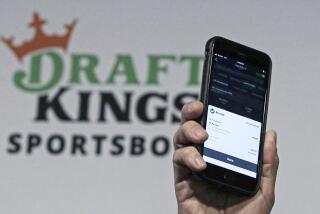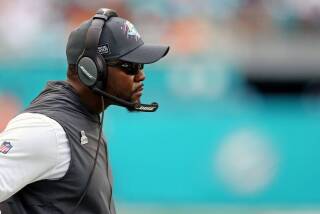NFL CONTROVERSIES : Union Offers Plan to Check Drug-Testing
- Share via
The aim of the National Football League’s drug program, as well as its accuracy and fairness, was challenged Thursday by the NFL Players Assn., which revealed its own plan to enhance the program and also serve as a check on the league.
But the NFL quickly rejected the plan, which was announced in a news conference at Atlanta by the union’s executive director, Gene Upshaw.
According to the NFLPA plan, urine samples collected by the league in preseason tests of all players starting this summer would be split into two portions. One would be analyzed by the NFL, the other by a laboratory contracted by the union.
“The purpose of this plan is to protect the players,” Upshaw said. “This will be a check on the league so that we can be sure there are no mistakes, no tampering or inaccurate results. We intend to collect, label, test and store our samples at a federally-certified testing facility.”
But NFL spokesman Joe Browne said that the plan is too unwieldly.
“If they want to have a second test, they can do so,” Browne said. “But it would have to be at a time other than our test. That’s due to the logistics involved and the numerous steps in our chain of custody (of the samples) procedure.”
Browne also said that even if the plan were acceptable to the NFL, it would be too late to implement this summer. One team, the Rams, opened its training camp for rookies Wednesday.
“They are proposing this new approach rather late,” Browne said.
Upshaw said he discussed the plan last week with Commissioner Pete Rozelle, who said the league could not agree to such a program.
“What do they have to hide?” Upshaw asked.
Upshaw said the plan was approved by the NFLPA Board of Player Representatives on June 11, but the announcement appeared timed to follow publication of a special report in the July 10 edition of Sports Illustrated that said there are “widespread irregularities, inconsistencies and misrepresentations in nearly every facet of the NFL’s drug program.”
The report also said that the “administrative competence and adherence to accepted drug-testing standards” of the league’s drug adviser, Dr. Forest Tennant, have been found “seriously wanting.” Tennant administers Community Health Projects, Inc., which includes two dozen methadone clinics in Fresno, Santa Barbara and the Los Angeles area.
According to the report, the NFL:
--Exaggerates the drug problem among players to justify a tough testing program.
--Subjects players to reasonable-cause testing, above and beyond the regular preseason testing agreed to by the NFLPA, based on a number of criteria, including “aberrant behavior.”
--Does not protect player confidentiality as required by its agreement with the NFLPA.
--Does not secure the urine samples to guarantee against tampering and contamination.
The report also said that many players and their agents believe the league plays favorites, warning some popular players in advance about impending drug tests or otherwise protecting them.
In an interview with The Times before the news conference, Upshaw accused the league of also targeting certain players for intensified drug testing.
“First, most of all of those (who have been suspended) were black,” he said. “They were having contract problems or in the midst of negotiating or about to start contract negotiations. Lastly, they were having other problems away from the field.
“There could have been some sort of hit list developed by NFL Securities. They have a network of ex-federal and law enforcement people to find out what players are doing or what kind of off-the-field problems they have. The NFL police force is gathering information and determining when to use it and how to use it.”
Browne said that the NFL treats all players equally in its drug program. “I can categorically deny that we were out to discipline certain individuals,” he said.
In the news conference, Upshaw also announced the formation of a Chemical Dependency Prevention Committee to develop a drug education program for players.
“We are also concerned that the league’s current plan is not geared toward rehabilitation,” he said. “It appears to be directed only toward penalties and punishment.”
Browne again disagreed.
“There have been countless man-hours and dollars spent by the clubs on that phase of the league’s overall program, on that phase of rehabilitation,” he said. “The treatment and counseling are available to each of the 28 clubs and through the league facilities if the player seeks it.”
Tennant also defended the NFL’s program against criticism from the NFLPA and Sports Illustrated.
“We have for years been criticized in sports that we are not doing our duty, that we are not accepting and carrying out our responsibilities of cleaning up the drug problem,” he said. “We have been criticized for not testing enough, for doing too much rehabilitation and counseling and education . . .
“(Now) they said we’re too tough, to back off.”
As for the criticism of his credentials and practices in the Sports Illustrated report, Tennant said: “I’m not going to address the personal attacks. I haven’t gotten used to them, but I get them. If anybody believes anything about me that Sports Illustrated wrote, they can come to our organization and take a look for themselves.”


